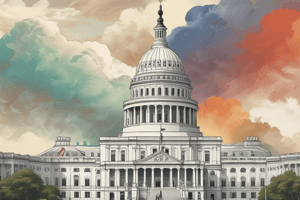Podcast
Questions and Answers
What type of government exercises power through a single ruler who may have divine rights?
What type of government exercises power through a single ruler who may have divine rights?
In an oligarchy, political power is exercised by a majority of the people.
In an oligarchy, political power is exercised by a majority of the people.
False (B)
What are the two forms of democracy mentioned?
What are the two forms of democracy mentioned?
Direct democracy and indirect (representative) democracy
In a ______ government, power is divided between national and local agencies.
In a ______ government, power is divided between national and local agencies.
Signup and view all the answers
Match the following forms of government with their characteristics:
Match the following forms of government with their characteristics:
Signup and view all the answers
Which of the following best describes 'sovereignty' in the context of colonization?
Which of the following best describes 'sovereignty' in the context of colonization?
Signup and view all the answers
Non-political laws continue to operate during colonization unless changed by the new sovereign.
Non-political laws continue to operate during colonization unless changed by the new sovereign.
Signup and view all the answers
In a ______ democracy, the state’s will is articulated through representatives selected by the people.
In a ______ democracy, the state’s will is articulated through representatives selected by the people.
Signup and view all the answers
Study Notes
Types of Government
- Monarchy: Rule by a single person, either absolute (ruling by divine right) or limited (governing according to a constitution).
- Aristocracy: Power held by a privileged few, known as aristocrats.
- Oligarchy: Similar to aristocracy, but power is based on wealth.
-
Democracy: Power exercised by the majority of the people.
- Direct/Pure Democracy: The will of the state is formulated directly by the people in mass meetings or assemblies.
- Indirect/Representative/Republican Democracy: The will of the state is formulated through representatives chosen by the people.
Forms of Government
- Unitary: National government controls both national and local affairs.
- Federal: Power is divided between national and local governments, each supreme within its jurisdiction.
- Parliamentary: Legislature has the power to remove the executive; the Cabinet or Ministry is responsible to both the legislature and the electorate.
- Presidential: Executive is independent of the legislature in terms of tenure, policies, and actions; both the president and members of the legislature are directly elected.
Sovereignty During Colonization
- Political Laws: Suspended or abrogated during colonization, requiring re-enactment by the new sovereign to remain in effect.
- Non-Political/Municipal Laws: Continue in operation unless changed by the new sovereign or contradicting its institutions.
- Judicial Decisions: Remain valid during occupation, even beyond those of a political nature which are annulled upon the restoration of the legitimate authority.
State and Sovereignty
- Dominium: State's ability to own or acquire property, including lands held in its proprietary capacity.
- Imperium: State's authority embodied in the concept of sovereignty.
Studying That Suits You
Use AI to generate personalized quizzes and flashcards to suit your learning preferences.
Related Documents
Description
Explore the various types and forms of government in this quiz. From monarchy to democracy, learn how power is structured and exercised within different systems. Test your knowledge on important concepts like unitary and federal governments.




